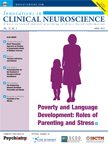Welcome to the April issue of Innovations in Clinical Neuroscience. This month, we lead with a topic we are covering for the first time in the journal and one we think you will find quite interesting: language development. In their review article, “Poverty and Language Development: Roles of Parenting and Stress,” Perkins, Finegood, and Swain focus on two theoretical models that link poverty with the brain systems affected in language problems: the family stress model and the parental investment model. The authors discuss the mechanisms through which poverty affects the brain, and specifically how parenting behaviors, particularly when influenced by stress, can impact language development in children. Through understanding these connections, the authors believe early identification and treatment of individuals with language development problems and better social policy may be possible.
Next, Naddafi et al examined the potential role of nicotine in the treatment of multiple sclerosis through their original study, “Novel Therapeutic Approach by Nicotine in Experimental Model of Multiple Sclerosis.” Using an animal model, the authors examined the use of nicotine, as both pre- and post-therapy, in mice immunized with experimental autoimmune encephalomyelitis. The authors found that treatment with nicotine caused a significant reduction in the severity and onset of the experimental autoimmune encephalomyelitis, indicating that nicotine has protective effects in an experimental model of multiple sclerosis.
Following this, Osiezagha et al review the psychiatric effects and treatment of thiamine deficiency in their article, “Thiamine Deficiency and Delirium.” The authors review and discuss the physiology, pathophysiology, predisposing factors, clinical manifestations (e.g., Wernicke’s encephalopathy, Wernicke-Korsakoff syndrome, structural and functional brain injuries), and diagnosis of thiamine deficiency and delirium, as well as the current treatment practices.
Next, Hanes et al describe the successful treatment of clozapine-induced incontinence in their case report, “Pseudoephedrine for the Treatment of Clozapine-Induced Incontinence.” A brief discussion is provided.
We wrap up the issue with two of our regular columns. First, Sansone and Sansone examine the relationship between borderline personality and obesity in this month’s The Interface. Through their literature search, they find an association between impulsive personality pathology and impulsive eating pathology, which underscores that a significant minority of individuals with obesity may suffer from borderline personality disorder, an important consideration when treating patients with obesity. And finally, in this month’s Research to Practice column, Dr. Steve Targum interviews Drs. Oleh Chaban and Serhiy Mykhnyak, practicing psychiatrists in the Ukraine. Through their enlightening discussion, Chaban and Mykhnyak provide us with a first-hand account of how the field of psychiatry has dramatically and positively changed in the Ukraine since the demise of the Soviet Union and its communist agenda.
We hope you enjoy the issue. As always, we welcome your submissions and feedback.
Sincerely,
Amir Kalali, MD
Editor, Innovations in Clinical Neuroscience






